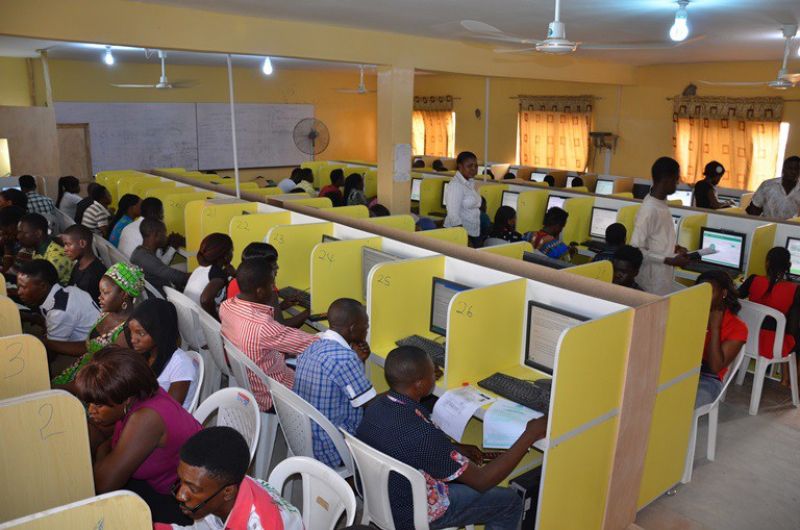JAMB and the rest of us
Posted by Factnews | 7 years ago | 2,391 times

By Eric Teniola
When General Olusegun Obasanjo (80) established the Joint Admissions and Matriculation Board, JAMB, on February 13, 1978 through amended decree 2 of 1978, Colonel Ahmadu Adah Alli (81) was the Minister for Education.
The Gbobe born soldier turned politician from Igala tribe in Kogi state later handed over to the Ogoni activist, Dr. Garrick B. Leton (1933-2003). These two men pioneered JAMB. The management of JAMB both past and present hold these two a debt of gratitude for the take off of the board.
The Board expanded its scope from limited University Admission to other tertiary Institutions with amended decree 33 of 1989 by General Ibrahim Badamosi Babangida(75) who later appointed Professor Jubrin Muhammed Aminu (78) as Minister for Education. It was the during the tenure of Professor Jubrin Aminu that JAMB became actively functional.
His coordination of JAMB at that time as a Minister between 1985 and 1989, was more pronounced than when he became Petroleum Minister between 1989 and 1992 and Nigeria’s Ambassador to America between 1999 and 2003. General Babangida poured a lot of money and attention into JAMB such that people at that time felt he was pursuing an ethnic agenda. Vice-Chancellors were constantly at war with him. No doubt JAMB came more alive during the era of General Babangida.
Professor Aminu who later became Senator served between 2003 and 2011 for Adamawa Central, later handed over to Professor Babatunde Aliu Fafunwa (1923-2010). The main purpose for the establishment of the board by the two Generals was for the unity of the country.
Before JAMB was established, there were no private universities and there were complaints by the parents over admission policies of the government owned Universities. Since 1978, various Registrars have served on the board as Chief Executives. They are Mr. M.S. Angulu, 1977 to 1986, Dr. Mohammed S. Abdulrahman, 1986 to 1996, Professor Bello Ahmed Salim, 1996 to 2006, Professor Adedibu Ojerinde, from Igboho in Oyo State, 2006 to 2016, Professor Is-haq Olanrenwaju Oloyede,(63) OFR,FNAL,2016 to date.
The JAMB was designed to among other things,(a) conduct Matriculation Examination for entry into all Universities, Polytechnics, and Colleges of Education (by whatever name called ) in Nigeria (b) appoint Examiners, Moderators, Invigilators, members of the Subject Panels and committees and other persons with respect to matriculation examinations and any other matters incidental thereto or connected therewith (c) place suitably qualified candidates in the tertiary institutions after having taken into account: (i) the vacancies available in each tertiary institution (ii) the guidelines approved for each tertiary institution by its proprietors or other competent authorities (iii) the preferences expressed or otherwise indicated by the candidates for certain tertiary institutions and courses. (iv) such other matters as the Board may be directed by the Honourable Minister to consider or the Board itself may consider appropriate in the circumstances (d) collate and disseminate information on all matters relating to admissions into tertiary institutions or any other matter relevant to the discharge of functions of the board. I am sure millions of Nigerian students have benefited from the Admission policy of JAMB.
When Professor Oloyede (63) was appointed Chief Executive and Registrar of JAMB last August, I called a close friend to inquire if it was the same Professor Oloyede of the University of Ilorin, he replied in the affirmative. I asked that question because of the two profiles of Professor Oloyede. First because of his position as Secretary General of the Nigerian Supreme Council for Islamic Affairs which was established in 1975 and his anti-corruption crusade while serving as Vice-Chancellor of the University of Ilorin and the way he transformed that University.
Professor Oloyede took over as the Secretary General of the Council in succession to Dr. Oladimeji Abdul lateef Adegbite (1938-2012) who was the late Seriki of Egbaland and the Baba Adinni of Egba Muslims in Ogun state. Professor Oloyede, who is from Abeokuta in Ogun State and whom I knew through a friend and colleague, Alhaji Nojeem Jimoh, former Editor of THE PUNCH, once described his late father as “the poorest of the landlords” in Akoka, Lagos. I knew there would be attacks on Professor Oloyede, on his policies and his style of Management.
Hear him: “On assumption of duty in August, it was obvious that I had to change the system for good; I chose to improve on what my illustrious predecessors had done. I wasn’t unaware of the cost of change in our society. The introduction of CBT posed and still poses its own new challenges especially with respect to our digital limitations in Africa.
Those who found the innovation revolutionary were things appear difficult. Besides those who benefited from the old order of the Pencil and Paper test, PPT, waged war in forms of protests and media onslaughts at the beginning. Then, others exploited the new CBT system to engage in conduct unbecoming at the expense of the Nigerian nation. When some of these issues were put on the table, it was realised that there was an urgent need for reforms of the CBT system to address prevailing lapses.
The challenges that would come from such reforms were not new to me because in 2007/2008 session, it was the University of Ilorin that introduced the CBT to test large numbers of undergraduates students and also screened thousands of the prospective candidates, I was the Vice-Chancellor and I knew well the SWOT (Strengths, Weaknesses, Opportunities and Threats) associated with innovations. Indeed. It was the University of Ilorin that provided JAMB with the Marshal Plan for the commencement of CBT in 2013, in line with the University of Ilorin pattern. Therefore I came to JAMB with 10 years’ experience of managing CBT examination. Even with the level of technical advancement in Nigeria, we need to make room for improvement in our technology advances.
In my resolve for far reaching reforms in the development of the sub sector of education, I announced a five-point-agenda to address the challenges in the system. The Agenda centred on five key areas I felt needed the most attention in the agency. They are Workers’ Welfare, Discipline, Technology, Transparency and Networking. It is my firm understanding that achieving these five critical goals will lead to the repositioning of the Board to meet the desire of Nigerians.
To ensure proper conduct of the 2017 examinations, the Board resolved that certain conditions and standards must be in place before the commencement of the sale of its application.
In view of this resolution, we reviewed some of our processes. The review took particular notice that CBT is an evolving phenomenon in JAMB. Some of the critics of the system fail to recognise that this is the 3rd year of the JAMB-CBT in Nigeria. We cannot move beyond what our current level of technology permits.”
The best way to stop the attacks and criticisms is for Professor Oloyede to transform JAMB to present day modernity. If he succeeds his critics will not count or be remembered but if he fails his critics will become heroes. It is up to him.
Readers Comments
comment(s)
No comments yet. Be the first to post comment.








